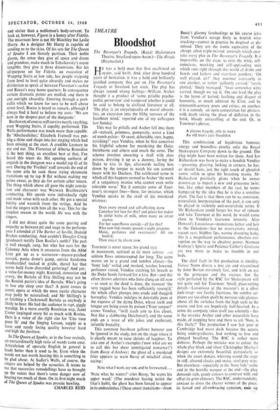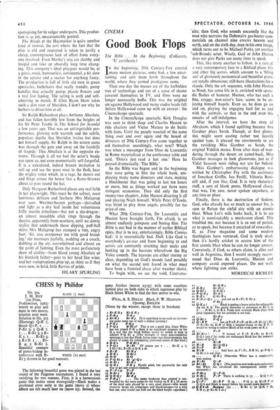THEATRE
Bloodshot
The Revenger's Tragedy. (Royal Shakespeare Theatre, Stratford-upon-Avon.)—The Rivals. (Haymarket.)
LIE was a bold man that first swallowed an ri oyster, said Swift. And, after three hundred
years of hesitation, it was a bold and brilliantly justified company that put on The Revenger's Tragedy at Stratford last week. The play has always roused strong feelings—William Archer thought it a product of 'some pitiable psycho- pathic perversion' and wondered whether it could be said to belong to civilised literature at all. The play is an encyclopaedia of moral obsceni- ties, an excursion into the filthy recesses of the Jacobean mind,' reported one of my colleagues last Sunday.
This way lie pitfalls and Archer fell into them all—naiveté, primness, pomposity, worst a kind of numb palate : '0 sweet, delectable, rare, happy, ravishing!' says Vendice, when he first conceives his frightful scheme for murdering the Duke. Swinburne and others said much the same. The scheme involves smearing a skull with slow poison, dressing it up as a dummy, luring the Duke to kiss its lips, afterwards nailing him down by the tongue to watch his son commit incest with his Duchess. The celebrated scene in which all this happens seemed to Archer 'the work of a sanguinary maniac who cannot even write tolerable verse.' Yet it contains some of Tour- neur's strongest lines—these, for instance, which Vendice speaks to the skull of his murdered mistress:
Does every proud and self-affecting dame Camphor her face for this? and grieve her maker In sinful baths of milk, when many an infant
starves For her superfluous outside—all for this? Who now bids twenty pounds a night, prepares Music, perfumes and sweetmeats? All are hush'd; Thou mayst lie chaste now.
Tourneur is never suave; his grand style • in movement, satirical at its most solemn and seldom flows uninterrupted for long. The scene moves on to a grand and sombre climax—the 'bony lady' veiled and masked, torches lowered, perfumes raised, Vendice catching his breath as the Duke bends forward for a kiss. But—and this often throws admirers who have clung on till now —as soon as the deed is done, the moment 'the very ragged bone has been sufficiently reveng'd,' the whole affair plunges into crude and thuggish horseplay. Vendice indulges in detestable puns at the expense of the dying Duke, whose teeth and tongue are being eaten by poison ('Your tongue!' crows Vendice, "twill teach you to kiss closer, Not like a slobbering Dutchman'), and the scene ends on a wave of vile jokes and exuberant, infantile brutality.
This common Jacobean gallows humour can be ignored in the study, not on the stage where it is clearly meant to raise shrieks of laughter. To take one of Archer's examples ('now what are we to call this but sheer unmitigated nonsense?') from Bussy d'Ambois: the ghost of a murdered friar appears to warn Bussy of mischief afoot, saying:
Note what I want, my son, and be forewarned ...
'Note what he wants?' cries Bussy, 'he wants his upper weed.' (The murderer having stolen the friar's habit, the ghost has been forced to appear in its underclothes.) These smart transitions—from Bussy's gloomy forebodings to his coarse joke. from Vendice's savage fixity to brutish wise- cracking—cannot in practice be despised or dis- missed. They are the ironic equivalent of the abrupt, often triple-twisted. reversals which over- take every plot in The Revenger's Tragedy. It is impossible, on the stage, to miss the witty, self- conscious, mocking and self-applauding vein which runs right through this world of drabs and bawds and lechers and stair-foot panders: 'Oh well played, sir!' they murmur constantly to one another, or rather 'gallantly carried,' rarely plotted,' finely managed,' "twas somewhat witty carried, though we say it.' On one level the play is the hymn of hatred, loathing and disgust of humanity, so much admired by Eliot, and by nineteenth-century poets and critics; on another, it is a comedy an open competition for plotters. with death taking the place of deflation in the brisk, bloody unravelling at the end. Or, in Tourneur's phrase,
A piteous tragedy, able to make An old man's eyes bloodshot.
This combination of lugubrious humour, energy and boundless cruelty suits the Royal Shakespeare Company down to the ground. The play might have been written for them. And Ian Richardson was born to make a fiendish Vendice —groaning, gloating, lurking in corners, he has. or should have, just the right touch of ghoulish comic relish to spice his brooding mania. Mr Richardson positively glows when he comes downstage to impart a new and gruesome twist; but, like other members of the cast, he seems hampered by the idea that he is also a sensitive plant. The fact is that there can be no consistent, naturalistic interpretation of the part, it can only be played in violently anti-naturalistic terms. If Mr Richardson could forget his fear of ridicule and take Tourneur at his word, he would come close to Vendice's fearsome intensity. Alan Howard's Lussurioso—monstrous lecher and heir to the Dukedom—has no reservations; misted, vacant eyes, blubber lips, wormy drooping body, this is a magnificent performance, absolute cor- ruption on the way to absolute power. Norman Rodway's Spurio and Patience Collier's Gratiana are two more to make us tremble in our beds.
The chief fault in this production is timidity. Trevor Nunn directs a text cut and streamlined by John Barton extremely fast, and with an eye to the grotesque and the vicious; but the style perfected by the RSC for Shakespeare will not quite suit for Tourneur. Small, place-setting details—Lussurioso at the masseur's in a silver jock-strap—are fussily facetious, the sombre set- pieces are too often spoilt by nervous side-glances. above all the switches from the high style to the coarse and low are hopelessly half-hearted. In a sense the company takes itself too solemnly—this is the mistake Archer and other naturalists have made, of stopping here and there to ask 'Now, is this likely?' The production I saw last year at Cambridge had more dash because the actors, being undergraduates, had nothing to lose and plunged headlong. The RSC is rather more dubious. Perhaps the mistake was to colour the whole play black and silver. Christopher Morley's designs are extremely beautiful, particularly so when the court dances, whirring round the stage in stiff, silvered cloaks and snaky, steel-grey wigs. But elsewhere—especially in the 'bony lady' scene and in the horrific masque at the end—the play demands rich, gaudy colours to contrast with and offset its grim climaxes. The RSC, understandably anxious to stress the chaster virtues of the piece, its famed and all-embracing cynicism, ends up apologising for its vulgar underparts. This produc- tion is, as yet, unaccountably genteel.
The Rivals at the Haymarket is quite another kind of revival, the sort where the fact that the play is old and respected is taken to justify a cheap, contemptuous lack of effort from every- one involved. Even Motley's sets are shabby and insipid and take an absurdly long time chang- ing. This company's ideal playgoer would be, at a guess, meek, humourless, sentimental, a bit slow in the uptake and a sucker for anything fancy. The production is full of little old men in green spectacles, bathchairs that really trundle, pump handles that actually pump, plastic flowers and a real live lapdog. The acting is arch and self- admiring to match. If Glen Byam Shaw takes such a dim view of Sheridan, I don't see why he bothers to direct him at all.
Sir Ralph Richardson plays Anthony Absolute, and has fallen horribly low from the heights of his Sir Peter Teazle in The School for Scandal a few years ago. That was an unforgettable per- formance, glowing with warmth and the subtle, populous depths that Sheridan invites but does not himself supply. Sir Ralph in the screen scene was through the gate and away on the foothills of tragedy. This Absolute is at the opposite ex- treme. Through it all we feel the actor's beady eye upon us, not even momentarily self-forgetful. It is a calculated, indeed brazen invitation to roll up and see the great man in the flesh, hear the mighty voice which, in a rage, he shoots out and flings across the house like a flame-thrower about to pass round the hat.
Only Margaret Rutherford places any real faith in her playwright. This must be the softest, most luminous. delicate and feathery Mrs Malaprop ever seen. Weather-beaten perhaps—shrivelled and light as a dry leaf inside her voluminous frilly muslin crinolines—but not a she-dragon: an almost inaudible click rings through the theatre, apparently from nowhere, until we slowly realise that underneath those dipping, puff-ball skirts Mrs Malaprop has stamped a tiny, angry foot. 'Sir, you overpower me with good breed- ing,' she murmurs joyfully, nodding on a couch, dabbing at the air, overwhelmed and almost on the point of fainting. Even the most perfunctory show of civility—from bland young Absolute or his blockish father—goes to her head like wine; and her malapropisms plop up, as shiny as if they were new, in brisk little flurries of pride.
HILARY SPURLING







































 Previous page
Previous page